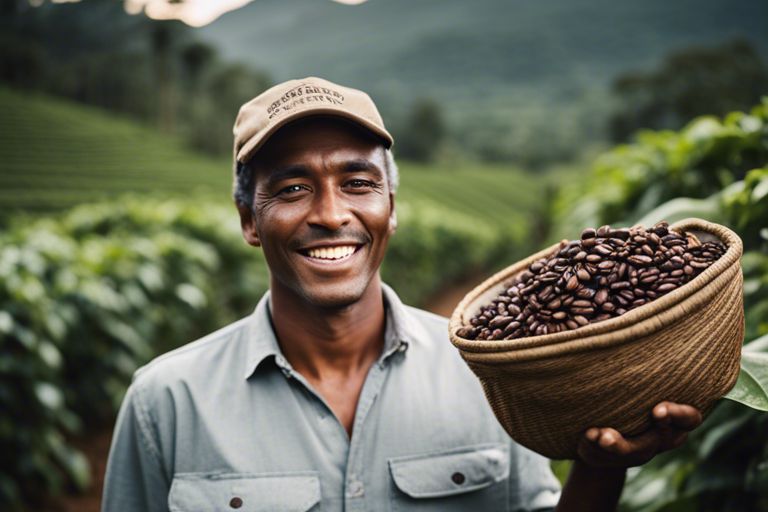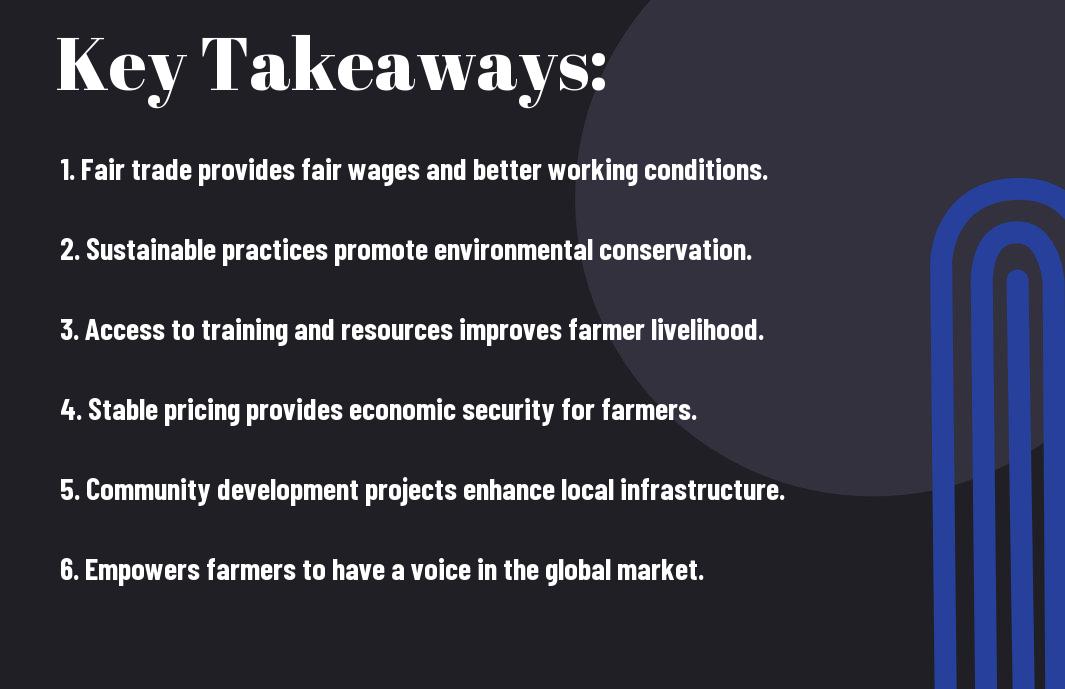Just as a small pebble creates ripples in a pond, choosing fair trade coffee sends significant waves of impact to farmers worldwide. Fair trade practices ensure that growers receive fair prices, empowering them to invest in their futures. To probe deeper into the positive effects of fair trade coffee on farmers, Meet some of the farmers behind your Fairtrade cup of coffee and witness the transformative power of your daily brew.

Key Takeaways:
- Economic Stability: Fair trade coffee provides farmers with stable prices, ensuring they receive a fair income for their hard work.
- Community Development: Fair trade practices enable farmers to invest in their communities by building schools, clinics, and other crucial infrastructure.
- Sustainable Practices: Fair trade encourages environmentally friendly farming methods, helping farmers preserve their land for future generations.
The Plight of Coffee Farmers
Low Prices and Poverty
With the global coffee market being notoriously volatile, coffee farmers often face the harsh reality of fluctuating prices. When coffee prices are low, farmers struggle to cover the costs of production, pushing many into poverty. This means that even though coffee is one of the most popular beverages worldwide, the farmers who cultivate it often live in poverty.
Limited Access to Markets
Limited access to markets is another significant challenge that coffee farmers encounter. Many small-scale coffee farmers in developing countries lack the infrastructure and resources to access international markets directly. As a result, they often have to rely on intermediaries who pay them unfairly low prices for their crop.
Plus, without direct access to markets, farmers have little visibility or control over the prices their coffee fetches. This lack of transparency leaves them vulnerable to exploitation by middlemen in the supply chain, further deepening the cycle of poverty.

What is Fair Trade Coffee?
Definition and Principles
The concept of fair trade revolves around ensuring that producers in developing countries are paid a fair price for their labor. Fair trade coffee, in particular, focuses on providing better trading conditions and promoting sustainability. It aims to empower farmers and workers in the coffee industry, allowing them to improve their living and working conditions.
Certification Process
Fair trade certification is a rigorous process that involves independent organizations verifying that producers meet specific social, economic, and environmental standards. This certification ensures that farmers adhere to fair trade principles and that the coffee they produce meets the criteria for fair trade practices.
Fair trade organizations work closely with farmers to help them meet the required standards. They provide training and support to ensure that the farmers understand the principles of fair trade and can implement them effectively in their production processes.
What sets fair trade certification apart is its focus on transparency and accountability. By following a strict certification process, fair trade coffee guarantees that farmers receive a fair price for their coffee, promoting sustainable farming practices, and supporting community development initiatives.
Economic Benefits for Farmers
Higher Prices for Coffee Beans
With fair trade practices, farmers are guaranteed a minimum price for their coffee beans, which is typically higher than the market price. This ensures that farmers receive a fair wage for their hard work and investment in growing quality coffee beans. Additionally, fair trade organizations often provide premiums on top of the guaranteed minimum price, which farmers can invest back into their farms or communities for further development.
Increased Income and Stability
For small-scale coffee farmers, fair trade certification can lead to increased income and financial stability. By receiving fair prices for their harvest, farmers can better provide for their families, invest in sustainable farming practices, and plan for the future. This stability helps protect farmers from fluctuations in the market price of coffee, ensuring a more reliable source of income.
This financial security also extends to the community as a whole, as fair trade practices promote social welfare initiatives such as education and healthcare programs funded by the premiums paid to farmers. This holistic approach contributes to the overall well-being and prosperity of coffee-farming communities.
Improved Livelihoods
On top of the direct economic benefits, fair trade coffee can significantly improve the livelihoods of farmers and their families. By adhering to fair trade principles, farmers are encouraged to follow environmentally sustainable practices, which not only protect the environment but also ensure the long-term viability of their farms. This leads to increased food security, better living conditions, and a more promising future for the next generation of farmers.
A commitment to fair trade coffee is a testament to the empowerment of farmers, as it gives them the tools and resources needed to thrive in a competitive market. By supporting fair trade practices, consumers can contribute to a more equitable and sustainable world where farmers are valued for their hard work and dedication.
Social Benefits for Farmers
Empowerment and Community Development
All fair trade coffee initiatives promote empowerment and community development among farmers. With fair trade practices, farmers are given a voice in the decision-making process, allowing them to have a say in how their farms are run and how the profits are utilized. This empowerment leads to a stronger sense of community as farmers work together towards common goals.
Access to Education and Healthcare
Development in fair trade coffee farming communities often means better access to education and healthcare. Fair trade premiums are invested back into the community to improve infrastructure and services. This leads to schools being built, scholarships being provided, and healthcare facilities being improved, benefiting not only the farmers but their families and the entire community.
The provision of access to education and healthcare services is crucial for the overall well-being and development of the farmers and their families. Education opens up opportunities for the younger generation, breaking the cycle of poverty, while improved healthcare leads to a healthier community with reduced medical expenses and increased productivity.
Women’s Empowerment
Empowerment of women in fair trade coffee farming communities is a significant social benefit. Women are often key players in coffee farming but may not always have a voice in decision-making or access to resources. Fair trade practices promote gender equality by ensuring that women have equal opportunities for training, leadership roles, and financial independence.
Social benefits of women’s empowerment in fair trade coffee include increased household income, better access to education and healthcare for their families, and a more inclusive and equitable community. When women are empowered, the entire community thrives, leading to sustainable development and improved quality of life for all.

Environmental Benefits for Farmers
Sustainable Farming Practices
One of the significant environmental benefits for farmers participating in fair trade coffee production is the encouragement and support for sustainable farming practices. Fair trade standards require farmers to follow environmentally friendly methods such as organic farming, crop rotation, and composting. These practices help maintain soil health, reduce the use of harmful chemicals, and promote biodiversity.
Conservation of Natural Resources
Resources such as water and forests are crucial for coffee farming. Fair trade certification promotes the conservation of these natural resources by encouraging farmers to implement water-saving irrigation techniques, prevent deforestation, and protect wildlife habitats. By conserving natural resources, farmers can ensure the long-term sustainability of their coffee farms and reduce their environmental impact.
Additionally, fair trade organizations often provide training and support to help farmers implement sustainable farming practices and improve resource management on their farms. This assistance can lead to increased efficiency, productivity, and overall environmental stewardship among coffee farmers.
Climate Change Mitigation
One of the most pressing environmental issues today is climate change, which directly impacts coffee production. Fair trade coffee farmers are encouraged to adopt climate-smart agricultural practices to mitigate the effects of climate change on their farms. These practices may include agroforestry, mulching, and shade-grown coffee cultivation, which help sequester carbon, enhance soil quality, and reduce greenhouse gas emissions.
Environmental benefits derived from fair trade coffee production not only impact farmers but also contribute to global sustainability efforts. By supporting fair trade coffee, consumers can play a vital role in promoting environmentally responsible practices in the coffee industry.
Challenges and Limitations of Fair Trade Coffee
High Certification Costs
An ongoing challenge for farmers participating in fair trade practices is the high certification costs involved. These costs can be prohibitive for smaller-scale farmers, creating a barrier to entry into the fair trade market.
Limited Market Access
Trade agreements and market dynamics can restrict the access that fair trade farmers have to global markets, limiting their potential for growth and economic stability.
For instance, some fair trade farmers may find themselves constrained by geographical limitations or face stiff competition from larger, non-fair trade coffee producers in the same regions.
Dependence on Middlemen
One of the limitations of fair trade coffee is the reliance on middlemen for the distribution and sale of their products. This dependence can sometimes lead to unfair pricing practices, ultimately impacting the farmers’ earnings.
To address this issue, organizations working within the fair trade coffee industry are exploring direct trade models that seek to eliminate the need for middlemen and promote more equitable relationships between farmers and buyers.
Summing up
To wrap up, fair trade coffee benefits farmers in various ways including providing them with stable prices, access to training and resources, and empowering them to invest in their communities. By participating in fair trade practices, farmers can improve their livelihoods and work towards a more sustainable future for themselves and their families. Overall, choosing to support fair trade coffee is not only a conscious choice for consumers but also a significant step in promoting social and economic justice for coffee farmers around the world.
FAQ
Q: What is fair trade coffee?
A: Fair trade coffee is coffee that is certified as having been produced and traded according to fair trade principles. This means that farmers are paid a fair price for their coffee, allowing them to invest in their farms and communities.
Q: How does fair trade coffee benefit farmers?
A: Fair trade coffee benefits farmers by ensuring they receive a fair price for their coffee, which provides them with a stable income. This allows farmers to improve their living and working conditions, invest in sustainable farming practices, and support their communities.
Q: What are some of the social benefits of fair trade coffee for farmers?
A: Fair trade coffee helps farmers by providing access to education and healthcare, fostering community development, and empowering marginalized groups, such as women and indigenous communities.
Q: How does fair trade coffee impact the environment?
A: Fair trade coffee promotes environmentally sustainable farming practices, such as organic farming methods and biodiversity conservation. By encouraging these practices, fair trade coffee helps protect ecosystems and wildlife habitats.
Q: How can consumers support fair trade coffee and farmers?
A: Consumers can support fair trade coffee and farmers by choosing to purchase fair trade certified coffee, educating themselves about the benefits of fair trade, and advocating for fair trade practices in their communities and workplaces.





